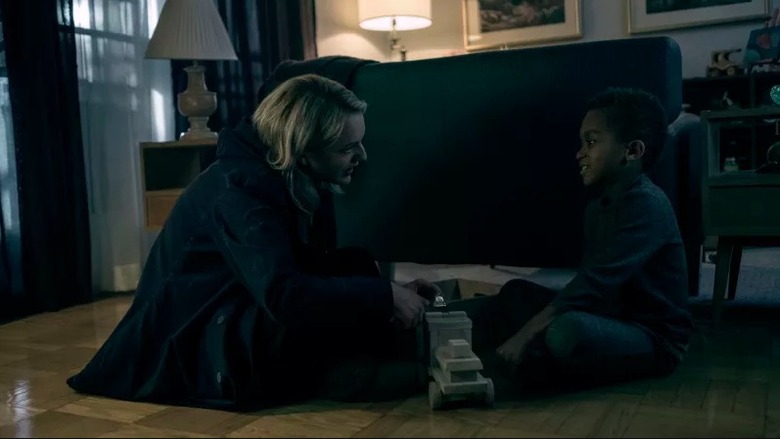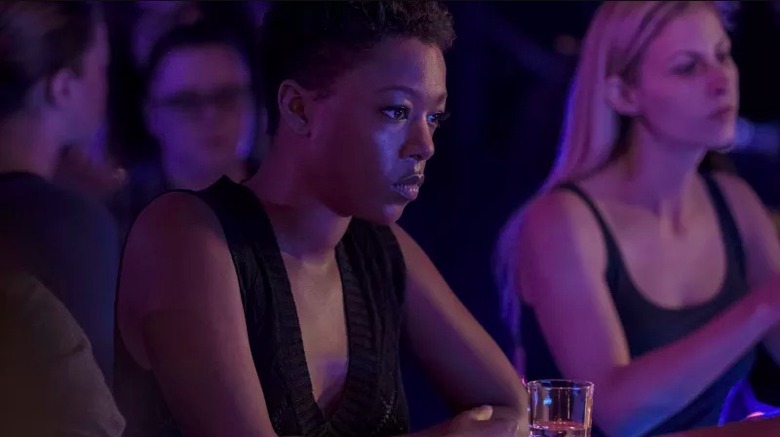"Baggage" Is The Cruelest Episode Of 'The Handmaid's Tale' Yet
(We're going to kickstart our weekly The Handmaid's Tale review by answering one simple question: Who suffered the most?)The Handmaid's Tale can get bleak, but never has it been so devastatingly cruel as it was in "Baggage." That's because the third episode of season 2 offered a resource that is progressively rare in Hulu's dystopian series: hope. The Handmaid's Tale dangled hope in front of us and June (Elisabeth Moss), only to rudely snatch it away at the last minute — in a distressing, infuriating sequence that will burn in my memory for the remainder of the season.
"Baggage" is a potent, powerful episode that briskly moves June's story along, though it stalls when it comes to other characters. That's all for the better, as June finds herself at the biggest crossroads of her life since fleeing the Commander's house.
Who Suffered the Most: June
June receives the biggest blow this episode because she was so close to salvation. After making the Boston Globe's abandoned offices her home for two months, carefully fixing and tweaking her memorial to its slaughtered employees, June finally receives the message she was waiting for from Nick: the escape is happening. But when he sadly tells her that he couldn't smuggle her daughter Hannah out of Gilead, she grows angry again, before sardonically repeating Lydia's mantra, "Better never means better for everyone."
Things seem to go swimmingly at first, as the amiable truck driver returns to smuggle her out of the Globe (which she looks back at with only a twinge of nostalgia), taking her to yet another empty warehouse where she awaits her ride. Her next guide, Omar (Yahya Abdul-Mateen II), interrogates her with questions that feel like they came out of internet authentication, and satisfied, hands her an envelope with information for her escape. But before he can drive her to the air field, he gets a text that sends him into a panic. Flustered and apologetic, he attempts to drive off without her, but June desperately pleads with him to help her. Guilt-ridden, he impulsively takes her to his apartment, where his wife and son live. But after the family doesn't return for an entire day after leaving for church, June grows paranoid and decides to trek off to the air field on her own.
She can almost taste her freedom, before it's ripped away from her in one of the most devastating twists the show has had yet. The initially suspicious pilot allows her into the small, cramped plane that will take her to Canada, but as soon as they take off — joined by a nervous former Driver — bullets rain down on the plane, killing the pilot and downing the plane. Soldiers immediately drag June screaming out of the hold, and the screen cuts to black. It's an absolutely devastating eleventh-hour twist that happens in the last five minutes of the episode. And in that moment, The Handmaid's Tale reminds you that hope is a false emotion, and the only thing in this world is hollow despair.
Hurt Like a Mother
Despite the action-packed movements of June's escape, the majority of "Baggage" is a powerfully introspective episode. The episode burns slowly as June spends her time waiting for rescue and pondering her relationship with her mom. The dreamy flashbacks to her tense conversations with her second-wave feminist mom Holly (a fantastic Cherry Jones) give the episode an almost surreal atmosphere, as June glosses over some of the rougher edges of their interactions.
Is it guilt she feels as she remembers her mom and thinks of how she failed as a parent? Or is it determination, as she attempts to save her unborn child from a life in Gilead? Both, the episode seems to imply, even as Holly chides her in flashback over "settling" for a life as a lowly assistant editor who wears skirts and cooks dinner for her fiancé. As a child, Holly would take June to her daily protests against the patriarchy, teaching her how to hold a sign before she could even write. But The Handmaid's Tale couldn't deign to leave us with simply rosy memories of a complex, flawed woman who espoused the kind of feminist mantras that June is slowly beginning to adopt. Another unusual flashback scene takes us back to June in Handmaid school, where Aunt Lydia extolls the value of the Colonies with a slideshow of the Unwomen working the radiation-poisoned land. And there on the screen: Holly. Every time we get a little glimpse of a silver lining, The Handmaid's Tale makes sure to make it rain tenfold.
Are You Brave Or Stupid?
My favorite part of the world-building in this season of The Handmaid's Tale is how quiet it is. There are no exposition-laden introductions or bombastic set pieces to show off the season's bigger budget. Everything simply is. It's part of what makes the series so terrifying — the way things are only slightly off from current times, and a reminder of how easy it is to accept oppression for just a little bit of security.
The Handmaid's Tale keeps expanding its world, giving us a glimpse of the Econo-people, the middle class of Gilead that "kept their heads down," as June muses. And their passivity seems to have helped them in the long run — they live in a downtrod, but respectable apartment, they keep their children, and only have to attend mandatory church services and wear shapeless grey outfits. But despite Omar's participation in May Day, his wife (Janelle Heron) is disgusted by June's appearance at her apartment, protesting their sheltering of her. She concedes to her husband, but demands that June touch nothing before berating her for giving up her child. "I would die first," she sneers. "That's what I used to think too," June responds sadly.
But what of Omar? Like the rest of the male characters, The Handmaid's Tale doesn't seem as interested in him as it is in the dynamics of its women. The most character-building we get of him happens when he's offscreen — when June stumbles upon his Quran and prayer rug under the bed. I wish he and his family weren't gone so soon, I would have liked to see more of their lives in the Econo-class.
Tale Tidbits


